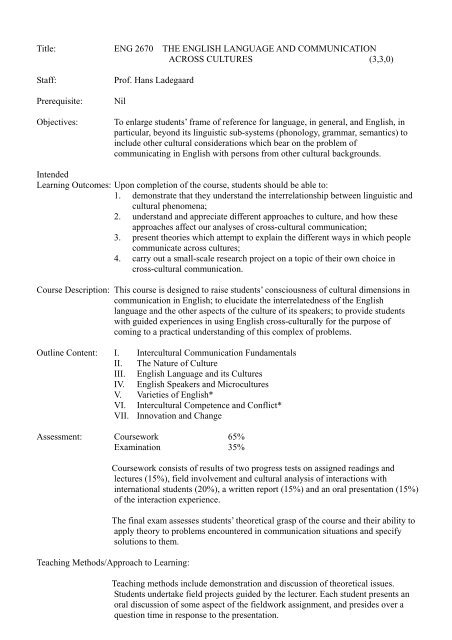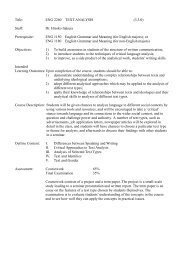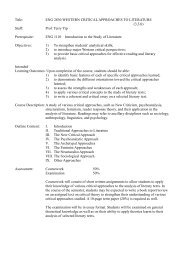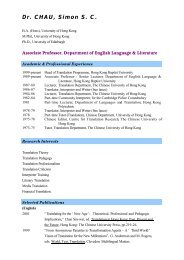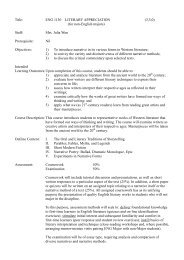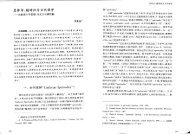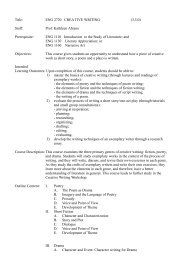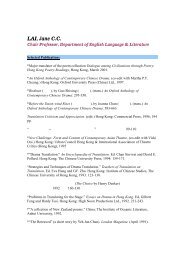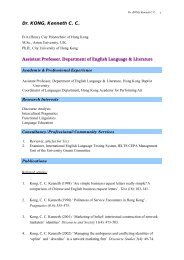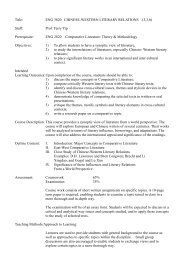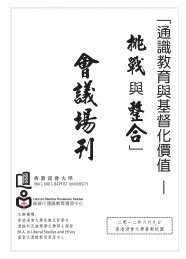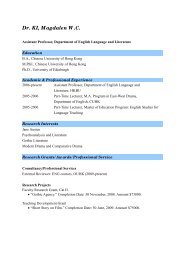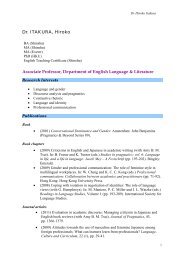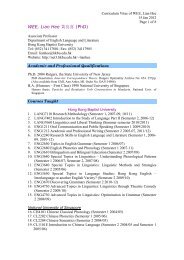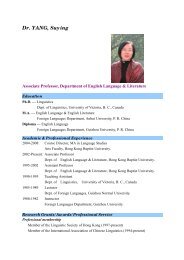ENG 2190
ENG 2190
ENG 2190
Create successful ePaper yourself
Turn your PDF publications into a flip-book with our unique Google optimized e-Paper software.
Title: <strong>ENG</strong> 2670 THE <strong>ENG</strong>LISH LANGUAGE AND COMMUNICATION<br />
ACROSS CULTURES (3,3,0)<br />
Staff: Prof. Hans Ladegaard<br />
Prerequisite: Nil<br />
Objectives: To enlarge students’ frame of reference for language, in general, and English, in<br />
particular, beyond its linguistic sub-systems (phonology, grammar, semantics) to<br />
include other cultural considerations which bear on the problem of<br />
communicating in English with persons from other cultural backgrounds.<br />
Intended<br />
Learning Outcomes: Upon completion of the course, students should be able to:<br />
1. demonstrate that they understand the interrelationship between linguistic and<br />
cultural phenomena;<br />
2. understand and appreciate different approaches to culture, and how these<br />
approaches affect our analyses of cross-cultural communication;<br />
3. present theories which attempt to explain the different ways in which people<br />
communicate across cultures;<br />
4. carry out a small-scale research project on a topic of their own choice in<br />
cross-cultural communication.<br />
Course Description: This course is designed to raise students’ consciousness of cultural dimensions in<br />
communication in English; to elucidate the interrelatedness of the English<br />
language and the other aspects of the culture of its speakers; to provide students<br />
with guided experiences in using English cross-culturally for the purpose of<br />
coming to a practical understanding of this complex of problems.<br />
Outline Content: I. Intercultural Communication Fundamentals<br />
II. The Nature of Culture<br />
III. English Language and its Cultures<br />
IV. English Speakers and Microcultures<br />
V. Varieties of English*<br />
VI. Intercultural Competence and Conflict*<br />
VII. Innovation and Change<br />
Assessment: Coursework 65%<br />
Examination 35%<br />
Coursework consists of results of two progress tests on assigned readings and<br />
lectures (15%), field involvement and cultural analysis of interactions with<br />
international students (20%), a written report (15%) and an oral presentation (15%)<br />
of the interaction experience.<br />
The final exam assesses students’ theoretical grasp of the course and their ability to<br />
apply theory to problems encountered in communication situations and specify<br />
solutions to them.<br />
Teaching Methods/Approach to Learning:<br />
Teaching methods include demonstration and discussion of theoretical issues.<br />
Students undertake field projects guided by the lecturer. Each student presents an<br />
oral discussion of some aspect of the fieldwork assignment, and presides over a<br />
question time in response to the presentation.
Required Text: Brislin, R.W., K. Cushner, C. Cherrie, and M. Yong. Intercultural Interactions: A<br />
Practical Guide. Beverly Hills: Sage Publications, 1986.<br />
References: Agar, M. Language Shock: Understanding the Culture of Conversation. New<br />
York: William Morrow & Co., 1994.<br />
BBC and The Open University. The Global Village (video-recording). Princeton,<br />
New Jersey: Films for the Humanities & Sciences, 1998. (AVH 420651)<br />
Cushner, Kenneth, and R.W. Brislin. Intercultural Interactions: A Practical<br />
Guide. 2nd ed. Thousand Oaks, California, London & New Delhi: Sage<br />
Publications, 1996.<br />
Dodd, C.H. Dynamics of Intercultural Communication. 5th ed. Madison, Boston:<br />
McGraw-Hill, 1998.<br />
Gareis, E. Intercultural Friendship: A Qualitative Study. Lanham, Md.: UP of<br />
America, 1995.<br />
Gudykunst, W.B. Bridging Differences: Effective Intergroup Communication.<br />
Thousand Oaks, CA: Sage Publications, 1998.<br />
Layton, M.S. Intercultural Journeys Through Reading and Writing. New York:<br />
Harper Collins Publishers, 1991.<br />
Neustupny, J.V. Communicating with the Japanese. Tokyo: The Japan Times,<br />
1987.<br />
Samovar, L.A., and R.E. Porter, eds. Intercultural Communication: A Reader.<br />
Belmont, Calif.: Wadsworth, 1997.<br />
Scollon, R., and S.W. Scollon. Intercultural Communication: A Discourse<br />
Approach. Oxford, U.K. & Cambridge, USA: Blackwell Publishers, 1995.<br />
* This is official course syllabus and minor changes may be made.


